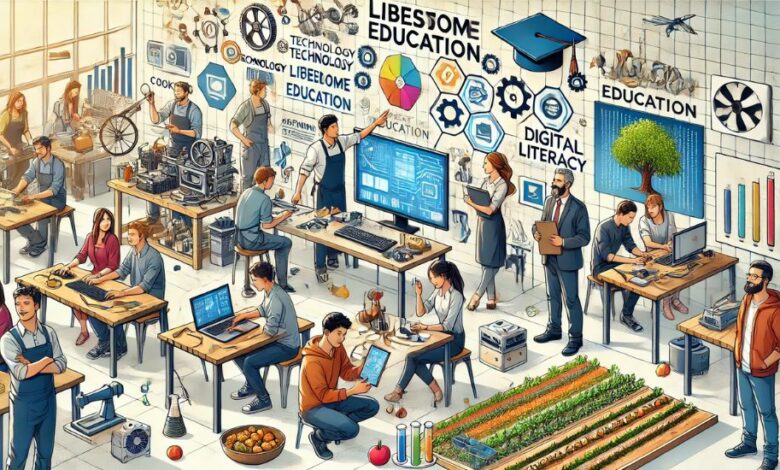Understanding Technology and Livelihood Education: Bridging Skills and Future Careers

Technology and Livelihood Education (TLE) plays a vital role in preparing individuals for practical, real-world applications of skills and knowledge. It merges traditional livelihood education with technological advancements to equip students with tools and capabilities essential in today’s economy. This unique combination of learning areas not only fosters academic growth but also opens doors to various career paths and entrepreneurial opportunities.
In this article by USA Magzines, we will delve deep into the core aspects of technology and livelihood education, its significance, and its implications on modern education systems, livelihoods, and global economies. TLE is more than just a subject; it’s a comprehensive educational framework that integrates diverse fields ranging from agriculture to home economics and from information technology to industrial arts. Let’s explore this dynamic field in detail.
What is Technology and Livelihood Education?
At its core, technology and livelihood education is a curriculum-based subject that focuses on imparting practical skills and knowledge to students. It is part of many educational systems, particularly in secondary education, where students are introduced to both traditional and modern techniques for self-sufficiency and employability.
TLE is divided into various components such as home economics, agriculture, industrial arts, and information and communication technology (ICT). These fields teach students essential life skills, ranging from cooking and sewing to digital literacy and software management. The objective is to prepare learners not just for employment but also for managing personal and familial responsibilities. With the growing relevance of technology in all areas of life, the inclusion of technology in this curriculum ensures that students remain competitive in the global job market.
The Importance of Technology and Livelihood Education in Today’s World
In today’s rapidly changing world, technology and livelihood education is critical for ensuring that students acquire a balanced skill set. The blend of traditional livelihood skills, like those taught in agriculture or home economics, with advanced technological education helps create well-rounded individuals. This is particularly important as technology continues to transform industries globally.
Students who go through TLE are equipped with both theoretical knowledge and hands-on experience, which are highly valued in many professional settings. Furthermore, TLE encourages entrepreneurship by teaching the practical aspects of running a business, from managing resources to applying technical know-how. In a competitive economy, these skills can make a significant difference.
In addition to contributing to economic growth, TLE also promotes a sense of independence and self-reliance. By learning how to use both traditional and modern tools, students can pursue various careers or even start their own ventures. This flexibility is particularly important in regions where formal employment opportunities may be limited.
Key Components of Technology and Livelihood Education
- Home Economics Home economics is one of the foundational pillars of technology and livelihood education. It teaches students the basics of managing a household, from cooking nutritious meals to handling finances. This component is especially valuable for promoting self-sufficiency, enabling individuals to thrive both in their personal lives and potential careers in related fields like hospitality or catering.
- Agriculture Agriculture remains a vital sector in many countries, and technology and livelihood education includes modules that teach the basics of farming, livestock management, and sustainable agriculture practices. With the integration of modern technology like smart farming and automated systems, students gain a forward-thinking approach to agriculture, enabling them to make use of resources efficiently and contribute to food security.
- Industrial Arts Industrial arts focus on skills like woodworking, metalworking, and mechanics. This component teaches students about craftsmanship, machinery, and the application of these skills in various trades. As industries move towards automation, understanding the basics of mechanics and industrial processes is crucial, especially in manufacturing and engineering fields. USA Magzines often highlights success stories of young professionals in these areas who have benefited from a strong foundation in TLE.
- Information and Communication Technology (ICT) ICT is arguably one of the most dynamic areas within technology and livelihood education. Students learn vital digital skills, from basic computer literacy to advanced software development and IT management. As the world becomes increasingly digital, having these skills opens up numerous opportunities in tech-related fields, from cybersecurity to digital marketing. ICT also plays a pivotal role in almost every career, making it a critical component of the TLE curriculum.
How Technology and Livelihood Education Benefits Students
- Career Preparedness The broad spectrum of skills taught in technology and livelihood education prepares students for diverse career paths. Whether a student is inclined towards agriculture, engineering, or IT, TLE offers foundational knowledge that can be applied in real-world scenarios. This kind of versatility is highly beneficial in modern job markets, where having a range of skills can make an applicant stand out.
- Hands-on Learning Unlike many other academic subjects, TLE emphasizes hands-on experience. Students engage in activities such as cooking, carpentry, and computer programming, allowing them to apply what they’ve learned in practical situations. This experiential learning model ensures that theoretical concepts are better understood and retained. In fact, studies featured in USA Magzines have shown that students who engage in TLE often have a higher retention rate of the knowledge they acquire.
- Promoting Entrepreneurship One of the most impactful benefits of technology and livelihood education is its ability to foster an entrepreneurial mindset. By teaching students practical skills and how to turn those skills into viable business ventures, TLE empowers students to create their own employment opportunities. Whether it’s starting a small bakery, an IT consultancy, or an organic farm, TLE gives individuals the tools to succeed in business.
- Lifelong Skills The skills learned through TLE are not just for short-term employment—they are skills for life. Whether it’s being able to fix household appliances, cook nutritious meals, or run a small business, TLE provides practical competencies that can be used throughout a person’s lifetime. In many cases, these skills can also be passed down to future generations, furthering the impact of TLE on society.
Future Outlook of Technology and Livelihood Education
The future of technology and livelihood education is incredibly promising, especially as the world continues to evolve with technological advancements. As industries like artificial intelligence, automation, and biotechnology grow, TLE programs will likely adapt to include more advanced technological components. This will ensure that students are not just learning traditional livelihood skills, but also gaining the technical expertise necessary for future careers in cutting-edge industries.
Moreover, TLE’s focus on sustainability, especially in areas like agriculture and industrial arts, will become increasingly relevant as the world faces environmental challenges. By incorporating eco-friendly practices and sustainable technologies into the curriculum, technology and livelihood education will continue to play a vital role in shaping future generations who are both skilled and socially responsible.
Conclusion
Technology and livelihood education offers a comprehensive and practical approach to learning that prepares students for both the present and future. By integrating hands-on skills with modern technology, TLE equips individuals with the tools they need to succeed in a variety of fields, from agriculture to ICT. This unique curriculum not only supports academic growth but also encourages entrepreneurship, independence, and lifelong learning.
As highlighted by USA Magzines, the impact of TLE is far-reaching, creating opportunities for students to excel both in their personal lives and in the global workforce. As education systems continue to evolve, the importance of TLE will only grow, ensuring that future generations are well-prepared to meet the challenges and opportunities of the 21st century.




